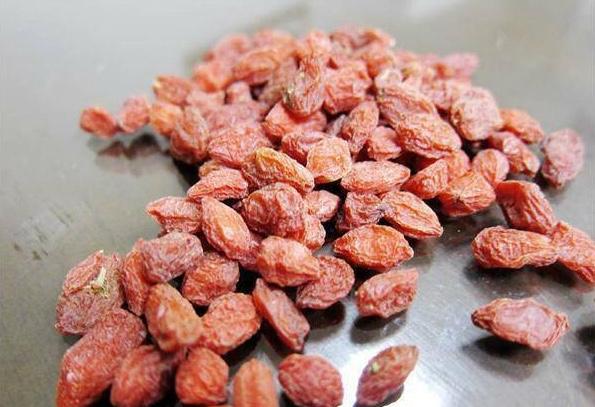All 30 goji berry products tested across the country were found to contain traces of heavy metals, primarily cadmium and lead, the Consumer Protection Association in Taiwan said today.
The association called on the government to raise standards and tighten border inspections and market monitoring, as some of the 30 were even certified as organic.
Suppliers should also disclose product origin and provide test reports for consumer reference, while consumers are advised to choose clearly labeled products, check test results and avoid excessive or prolonged consumption, it added.

Photo: Taipei Times
Goji berries have become popular in recent years due to their perceived health benefits, consumed in teas, soups or eaten whole.
However, Taiwan does not produce goji berries, only goji leaves, so all berries sold in Taiwan are imported.
About 90 percent originate from China, in particular Xinjiang, Qinghai and Gansu provinces.
Four products were found to have surpassed the permissible limit for cadmium levels in Taiwan, set at 0.05ppm, with the worst offender found to contain 0.081ppm, the association said.
The products were sold at a chain supermarket, a wholesale market and an online shopping platform, it said.
Two products were found to have lead levels of 0.13mg/kg, exceeding the permissible limit of 0.1mg/kg, with one a red berry variant sold in a supermarket chain and the other a black variety purchased online, it said.
During the production process, there are many instances in which goji berries may come into contact with contaminated soil, fertilizer or irrigation, while the berries naturally absorb heavy metals from soil, it added.
However, heavy metal limits are based on fresh fruit, whereas all goji berries sold in Taiwan are dried, it said.
As heavy metal concentrations are often amplified by the drying process due to water loss, even if tests show levels above the set standard, they cannot technically be considered violations, although they may still pose a potential health risk if consumed long-term, the association said.

SHIPS, TRAINS AND AUTOMOBILES: The ministry has announced changes to varied transportation industries taking effect soon, with a number of effects for passengers Beginning next month, the post office is canceling signature upon delivery and written inquiry services for international registered small packets in accordance with the new policy of the Universal Postal Union, the Ministry of Transportation and Communications said yesterday. The new policy does not apply to packets that are to be delivered to China, the ministry said. Senders of international registered small packets would receive a NT$10 rebate on postage if the packets are sent from Jan. 1 to March 31, it added. The ministry said that three other policies are also scheduled to take effect next month. International cruise ship operators

HORROR STORIES: One victim recounted not realizing they had been stabbed and seeing people bleeding, while another recalled breaking down in tears after fleeing A man on Friday died after he tried to fight the knife-wielding suspect who went on a stabbing spree near two of Taipei’s busiest metro stations, Taipei Mayor Chiang Wan-an (蔣萬安) said. The 57-year-old man, identified by his family name, Yu (余), encountered the suspect at Exit M7 of Taipei Main Station and immediately tried to stop him, but was fatally wounded and later died, Chiang said, calling the incident “heartbreaking.” Yu’s family would receive at least NT$5 million (US$158,584) in compensation through the Taipei Rapid Transit Corp’s (TRTC) insurance coverage, he said after convening an emergency security response meeting yesterday morning. National

PLANNED: The suspect visited the crime scene before the killings, seeking information on how to access the roof, and had extensively researched a 2014 stabbing incident The suspect in a stabbing attack that killed three people and injured 11 in Taipei on Friday had planned the assault and set fires at other locations earlier in the day, law enforcement officials said yesterday. National Police Agency (NPA) Director-General Chang Jung-hsin (張榮興) said the suspect, a 27-year-old man named Chang Wen (張文), began the attacks at 3:40pm, first setting off smoke bombs on a road, damaging cars and motorbikes. Earlier, Chang Wen set fire to a rental room where he was staying on Gongyuan Road in Zhongzheng District (中正), Chang Jung-hsin said. The suspect later threw smoke grenades near two exits

The Forestry and Nature Conservation Agency yesterday launched a gift box to market honey “certified by a Formosan black bear” in appreciation of a beekeeper’s amicable interaction with a honey-thieving bear. Beekeeper Chih Ming-chen (池明鎮) in January inspected his bee farm in Hualien County’s Jhuosi Township (卓溪) and found that more than 20 beehives had been destroyed and many hives were eaten, with bear droppings and paw prints near the destroyed hives, the agency said. Chih returned to the farm to move the remaining beehives away that evening when he encountered a Formosan black bear only 20m away, the agency said. The bear